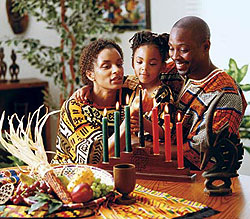The 1st Day of Kwanzaa
Kwanzaa is a week-long celebration held in the United States (and more recently, Canada) but also celebrated in the Western African Diaspora. The celebration honors African heritage in African-American culture, and is observed from December 26 to January 1, culminating in a feast and gift-giving.It is ideological, with seven core principles (Nguzo Saba): Unity, self-determination, collective work and responsibility, cooperative economics, purpose, creativity, and faith. It was created by Maulana Karenga, and was first celebrated in 1966–67.

Black candle, placed right in the middle of red and green candles in Kinara, is lit on the very first day of the festival. It marks the commencement of the festive season. The person who takes the responsibility to light the candle makes a statement about the first principle i.e. Umoja (oo-MOH-jah) or unity. All the family members should listen to the statement and understand it in a way that all of them can explain the doctrine and its meaning. At times that particular member shares a passage or poem which is related to their lives and the principle in some way or the other.
The Umoja (Unity cup) filled with fruit juice is passed to all the members present in that congregating spot. Some of the families use a Unity cup for every member present where as some just like to keep a Unity cup in the centre of the Kwanzaa table. After the ceremony of sharing fruit juice is over, the candles are turned off till the very next day.
As an African American and Pan-African holiday celebrated by millions throughout the world African community, Kwanzaa brings a cultural message which speaks to the best of what it means to be African and human in the fullest sense. Given the profound significance Kwanzaa has for African Americans and indeed, the world African community, it is imperative that an authoritative source and site be made available to give an accurate and expansive account of its origins, concepts, values, symbols and practice.
ReplyDeleteMoreover, given the continued rapid growth of Kwanzaa and the parallel expanded discussion of it and related issues, an authoritative source which aids in both framing and informing the discussion is likewise of the greatest importance. Therefore, the central interest of this website is to provide information which reveals and reaffirms the integrity, beauty and expansive meaning of the holiday and thus aids in our approaching it with the depth of thought, dignity, and sense of specialness it deserves.
The holiday, then will of necessity, be engaged as an ancient and living cultural tradition which reflects the best of African thought and practice in its reaffirmation of the dignity of the human person in community and culture, the well-being of family and community, the integrity of the environment and our kinship with it, and the rich resource and meaning of a people's culture.
Today is the birthday of Chris Daughtry. He is an American musician best known as the lead vocalist and rhythm guitarist for the rock band Daughtry and as the fourth-place contestant on the fifth season of American Idol. After his elimination from Idol, he was given a record deal by RCA Records and formed a band called Daughtry. Their self-titled debut album became the fastest selling debut rock album in Nielsen Soundscan history, selling more than one million copies after just five weeks of release. The album was recorded before the band was officially formed, making Chris Daughtry the only official member present on the album. In its ninth week of release, Daughtry reached number one on the Billboard charts. Chris Daughtry is now the third most successful American Idol contestant in terms of record sales, behind only Kelly Clarkson and Carrie Underwood, who both won their respective seasons. At the 50th Grammy Awards, the band was nominated for Best Rock Song for the single "It's Not Over". Since the band's first album, Chris Daughtry has collaborated with several artists, including Slash, Sevendust, Theory of a Deadman, and Carlos Santana. He is known for his powerful vocal belting technique and wide vocal range.
ReplyDelete